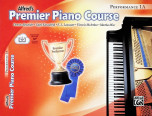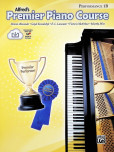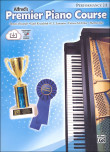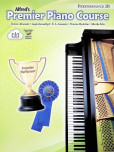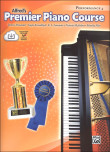We use cookies to make your experience better. To comply with the new e-Privacy directive, we need to ask for your consent to set the cookies. Learn more.
This is a brand new series from Alfred. The obvious question would be, "How is this series different from Alfred's Basic Piano Course?" Well, there are many differences, from minor changes in the way concepts are introduced to more significant changes such as the fact that this course uses a "non-position" approach (meaning that it doesn't rely on specific fingers for specific keys). Some of the things that make this course unique are: 1) Students learn to name notes without having to correlate them with a position. 2) Bass clef is introduced first, as many students end up weaker in this area. 3) Rhythm is taught using multi-note patterns rather than single notes. 4) Ear training and sight reading are both integrated into the course. 5) Parents are utilized as a key to the success of their child. For additional information, visit www.premierpianocourse.com to learn more about what makes this program different.
This course was developed to be comprehensive, appealing to students, and student-, teacher-, and parent-friendly. It features new music, attractive illustrations, and thoughtful organization. The lesson book is the main focus. It covers note reading, sight reading, rhythm reading, and technical workouts accompanied by fun musical arrangements and colorful illustrations. An included CD or digital downloads contain all of the music at both performance speeds as well as slower practicing speeds. Theory books complement the lesson books and focus on music theory. Performance books offer additional music to play, and At-home books encourage parents to get involved in practice time by seeing what the child is working on and helping them review the concepts they've learned in between lessons. The books are all clearly marked so it's easy to coordinate use between the lesson book and additional books. Flash cards help with sight reading and learning music symbols and patterns. We now offer these components all separately or in Success Kits (only available for Levels 1A and 1B at this time). Success Kits contain all of the components described above (lesson book w/ CD, theory book, performance book w/ CD, at-home book and flash cards) in a vinyl, zippered storage case.
Technique books for Alfred's Premier Piano Course are now available. These books help students develop their playing technique. Technique tools such as relaxed shoulders, arm weight, and strong fingertips are introduced in Level 1A. More advanced techniques such as two-note slurs, heavy damper pedal footwork, and double-note shifts and are covered in later levels. The technique books are especially easy to incorporate as they directly correlate to the lesson books. Please note that the Levels 1A and 1B Technique Books are not included in the corresponding Success Kits.
Also available are Alfred's Christmas Books 1A and 1B. Each book features 10-11 songs, with each song containing an accompanying duet part (this is intended for the teacher to play, as it is significantly more advanced). Each song also contains a colorful illustration and a short paragraph explaining the history of the song.
